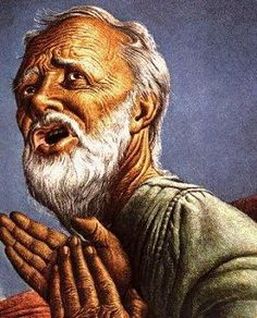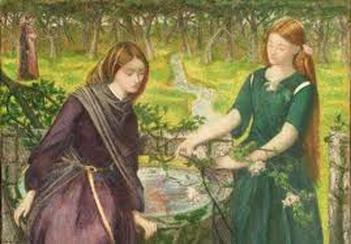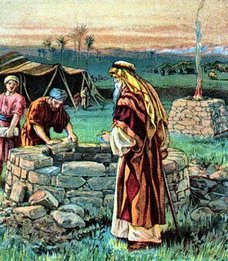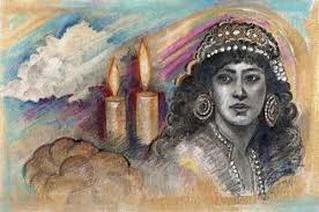
וישׁלחו את־כתנת הפסים ויביאו אל־אביהם ויאמרו זאת מצאנו הכר־נא הכתנת בנך הוא אם־לא׃
Then they sent the long-sleeved robe and brought it to their father, saying, "We found this. Do you know if it's your son's robe or not?" (Gen 37:32)
This week the text of the Torah seems to easily get distracted from the main story of Joseph and his brother in order to go into the particulars of Judah’s family. As I said, it “seems” to get distracted, because it really doesn't.
BUT WHAT IS THE STORY REALLY ABOUT?
This text is more than the narrative of the Abrahamic family. It is more than a historical account. It is also an ethical blueprint for mankind. It depicts the notions of right and wrong. It reveals how the patriarchs drew HaShem's favor upon them. It is an ethical guidebook written to imbed us with the moral compass that should lead our lives.
GOD GETS GLORY FROM CONCEALING THINGS. (Pro 25:2)
Messianic related concealment of identity seems to be a principle behind the dynamics of the Abrahamic family. It started with Abraham. The Talmud tells us of a story where Terah concealed his son's Abram identity in order to protect he, through whom all the families of the Earth will be blessed, from Nimrod’s wrath.
(Read story HERE)
Later, Abraham concealed his wife's identity to protect the womb that would cradle HaShem's promises of good will towards fallen humanity. Isaac follows in the example of his father and grandfather in order to protect the Messianic womb that will conceive the family's of Israel.
Jacob, who also deceived his father Isaac in order to protect the covenant, is himself deceived by his son Judah, who reaps the fruits of his deception by being deceived by his daughter-in-law, Tamar, which brings us to par’shat Vay'shev.
THE REVELATION OF JOSEPH
This week, the Torah narrative takes us through the revelation of Joseph. It was not an easy revelation. His brothers hated him for what they considered to be his guilt of pride, and as a result sold him to a caravan of Ishmaelites. When they returned home, they couldn't bring themselves to tell the truth to their father so they concocted a lie.
They took Yosef's robe, killed a male goat and dipped the robe in the blood. Then they sent the long-sleeved robe and brought it to their father, saying, "We found this. Do you know if it's your son's robe or not?" He recognized it and cried, "It's my son's robe! Some wild animal has torn Yosef in pieces and eaten him!" Ya`akov tore his clothes and, putting sackcloth around his waist, mourned his son for many days.
(Gen 37:31-34)
It was Judah’s idea to sell Joseph. Later with his brothers he presented Joseph's bloody coat to Jacob. As he did, he was careful not to lie but let poor Jacob draw his own conclusions as he said" הַכֶּר-נָא /recognize these!” (Gen 37:32)
THE CONCEALMENT OF JOSEPH, and what about these goats?
Joseph, one hated without a cause, the innocent victim of the jealousy of his brothers, is now presented to his father. He is presented to his father under the disguise of a coat soiled by the blood of a goat. It is important to remember at this point of the story that Jacob himself hid under the skin of a goat in order to deceive Isaac in pretending to be Esau.
As Joseph’s true where about are concealed from his father, Joseph is hidden in plain sight,as an Egyptian, while concealed from the wrath of his brothers
To the furtherance of the displeasure of his father, Judah married Tamarthe Canaanite. His two first boys, Er and Onan die before she can give them any offspring. Call him superstitious if you want to, but Judah hesitates before letting letting Shilah, his third son, marry Tamar. But Tamar, though a Canaanite, seems to know what is at stake here: the Abrahamic promises. She might have understood that Joseph being out of the picture, Reuben, Simeon, and Levy having disqualified themselves, Judah was now next in line for the firstborn rights. She did not want to let that pass.She makes sure that the Abrahamic promises are kept.
So she took off her widow's clothes, completely covered her face with her veil, and sat at the entrance to `Einayim, which is on the way to Timnah. For she saw that Shelah had grown up, but she still was not being given to him as his wife. When Y'hudah saw her, he thought she was a prostitute, because she had covered her face. So he went over to her where she was sitting and said, not realizing that she was his daughter-in-law, "Come, let me sleep with you." She answered, "What will you pay to sleep with me?" He said, "I will send you a kid from the flock of goats." She said, "Will you also give me something as a guarantee until you send it" He answered, "What should I give you as a guarantee?" She said, "Your seal, with its cord, and the staff you're carrying in your hand." So he gave them to her, then went and slept with her; and she conceived by him. She got up and went away, took off her veil and put on her widow's clothes. Y'hudah sent the kid with his friend the `Adulami to receive the guarantee items back from the woman, but he couldn't find her. He asked the people near where she had been, "Where is the prostitute who was on the road at `Einayim?" But they answered, "There hasn't been any prostitute here." So he returned to Y'hudah and said, "I couldn't find her; also the people there said, 'There hasn't been any prostitute here.' " Y'hudah said, "All right, let her keep the things, so that we won't be publicly shamed. I sent the kid, but you didn't find her." About three months later Y'hudah was told, "Tamar your daughter-in-law has been acting like a whore; moreover, she is pregnant as a result of her prostitution." Y'hudah said, "Bring her out, and let her be burned alive!" When she was brought out, she sent this message to her father-in-law: "I am pregnant by the man to whom these things belong. Determine, (הַכֶּר-נָא) I beg you, whose these are -- the signet, the cords and the staff." (Gen 38:14-25)
Judah recognizes that he had been deceived. He recognizes it as he hears the exact same words (הַכֶּר-נָא) (Gen 38:25)he told his father when he deceived him concerning Joseph (Gen 37:32). Judah could have been proud and still demand Tamar’s death but he did not. He allowed his heart to be convicted and confessed ...
"She is more righteous than I, because I didn't let her become the wife of my son Shilah." (Gen 38:26)
AND WHAT DO WE LEARN FROM THIS?
Why did HaShem chose to do things this way? I don't know. Maybe to mettle our character; to cause us to search, to fight for the cause, and not give up. Maybe it is to bring suspense to the story. Whatever the reason, these stories keep us seeking, guessing, and maybe that is the reason why.
Measure for measure.
A very important principle we can learn from these texts is that of “Measure for measure.”The bread that we send upon the waters returns to us after many days”, and “A person reaps what he sows” (Ecc 11:1; Gal 6:7).
Both the good and the evil that we spread returns to us. The good things that come our way may be the results of us sowing good things in the lives of others, and the bad things that come our way may be the results of our wicked actions towards others. So when bad things happen to us, we should not automatically blame HaShem or even haSatan. What we reap is usually the result of our sowing. This whole idea of concealed identity did start with Terah, and had repercussion down to the 4th generation (Ex 34:7).
Now, what about these goats?
What more specific messianic identity maker could we find in these stories than the returning motif of the goats when later Messiah Himself is symbolized as the Yom Kippur goat (Leviticus 10 and 16).
This story is the story of the revelation of the concealed Messiah, Messiah concealed under a goat.
The concealed Messiah is a returning motif in the texts of the Talmud and of the Midrash. King Solomon taught us that “God gets glory from concealing things; kings get glory from investigating things.” (Pro 25:2) HaShem surely keeps us guessing, but we get the glory from investigating what HaShem has concealed.
It is a game of hide and seek. The “appearing and disappearing” properties of Messiah are alluded to in another illustration given us from King Solomon “My darling is like a gazelle or young stag. There he is, standing outside our wall, looking in through the windows, peering in through the lattice. “(Son 2:9)
Gazelles and young stags live in the woods. They are not easily found. Hunters have to outsmart them. Sometime they see them only to see them disappear the next minute because of their colors that mix with that of the forest. The sages of the midrash did not miss the analogy. Here is what they said about Son 2:9:
“‘My beloved is like a gazelle;’
What is this gazelle that appears and disappears,
appears and disappears again,
So the first redeemer appeared, disappeared, and appeared again.”
(Song of Songs Rabbah 2:9)




 RSS Feed
RSS Feed